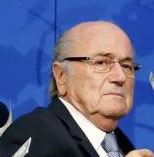ZURICH, (Reuters) – World soccer’s governing body FIFA will proceed with an election to pick a new president tomorrow to replace the disgraced Sepp Blatter and vote on a set of reforms aimed at restoring its credibility after the worst graft scandal in its history.

One candidate had sought to have the vote on a new president delayed but sport’s highest tribunal threw out his request, clearing the way for FIFA to hold its planned Extraordinary Congress in Zurich.
FIFA urged members to approve its reforms at the congress, including term limits for top officials and disclosure of their earnings, to rebuild trust after several dozen officials were indicted in the United States and a criminal investigation was begun in Switzerland.
Swiss Blatter, whose 18-year tenure officially ends this week, had hoped to attend the Congress but lost an appeal against his eight-year ban for ethics violations, meaning he must stay away.
The federation’s appeal committee nevertheless reduced the suspension to six years in acknowledgement of Blatter’s “services rendered to FIFA.”
The committee also shaved two years off its suspension for European soccer boss Michel Platini, who had been favourite to replace Blatter until an investigation began into a $2.03 million payment FIFA made to him in 2011 for work done a decade earlier.
“Mr Platini’s and Mr Blatter’s activities and the services they had rendered to FIFA, UEFA and football in general over the years should deserve appropriate recognition as a mitigating factor,” the committee said.
Platini was not impressed.
“The decision is insulting, shameful and is a violation of rights,” he said in a statement.
“The charges against me are baseless, built from the ground up and surreal in view of the facts and the explanations I gave during the hearing.”
Five candidates are standing to replace Blatter to try to lead FIFA out of its crisis.
In a sign of the level of distrust over the election, candidate Prince Ali Bin Al Hussein of Jordan had asked the Court of Arbitration for Sport (CAS) to delay the vote on concerns over the voting booths.
MOBILE PHONES
Worried that delegates might use their mobile phones to photograph their ballot sheets in a vote which is supposed to be secret, Ali had demanded transparent booths.
His campaign team even had some of the booths flown in and displayed them to the media at a warehouse on the outskirts of Zurich. Nevertheless, CAS rejected his request.
“The only positive aspect of today’s ruling is it that the election will now go forward as planned, and the media will be closely watching for any evidence that anyone is photographing their ballot,” Ali said in a statement.
As Ali’s case was thrown out, another candidate, Jerome Champagne, said he would appeal to CAS over the amount of observers who would be allowed into the congress hall on Friday.
But he did not ask for a postponement of the election itself.
“The election cannot be delayed, it’s just to point the finger at a problem,” the Frenchman told reporters.
Both Ali and Champagne have expressed concern over the fact that FIFA’s continental confederations do not vote but often issue declarations of support for particular candidates, potentially skewing the election results.
FIFA’s 209 member national associations (FAs) each hold one vote and secret voting means they can ignore directives without being found out. Ali has said FAs who do not toe the line can find they suffer reprisals from their continental confederations.
Gianni Infantino, general secretary of European governing body UEFA, and Asian soccer boss Sheikh Salman bin Ebrahim Al Khalifa are seen as the favourites to replace Blatter.
South African businessman and politician Tokyo Sexwale is the other candidate.
Tomorrow’s congress will also vote on a package of reforms seen as crucial for cleaning up FIFA’s image, even as investigations continue in the United States and Switzerland.
FIFA’s executive committee yesterday called on the FAs to vote in favour of the reforms, which acting president Issa Hayatou described as “critical” to the federation’s future.
“The eyes of the world are on us this week after one of the most challenging times in our history,” Hayatou told the committee, according to a FIFA statement.
“The approval of the reforms will send a strong message that we have listened and that we are taking the action necessary to regain trust and improve our performance.”




